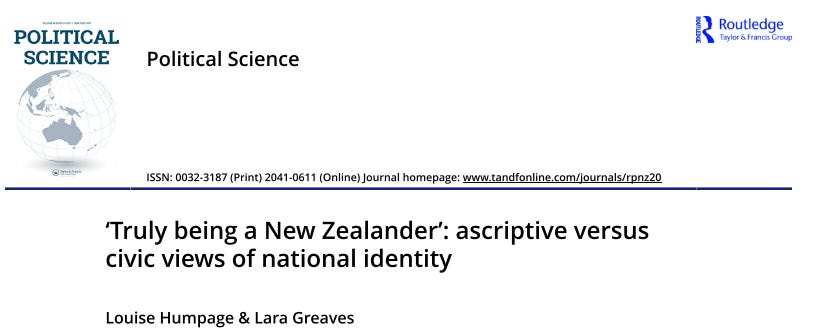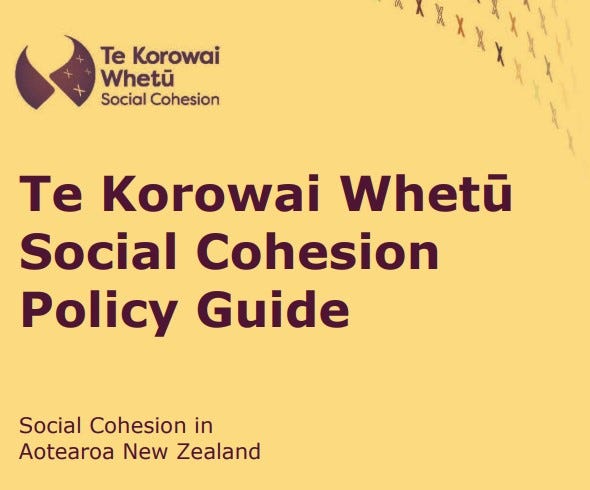Who is a true New Zealander? Spoiler: its not black and white
Who is considered as a true New Zealander in an increasingly divided Aotearoa? This week, I’m breaking down two competing views of national identity. Have a read and let me know what you think.
A few weeks ago, I shared some insights from my PhD journey, where I’m digging into how housing policy shapes social cohesion in New Zealand. Social cohesion is generally defined as having a sense of belonging, which I don’t think is a helpful of fit for purpose definition, but let’s entertain that idea for a minute. Assuming it is about belonging, who then belongs and what does it even mean to be a New Zealander? Well, let’s just say, opinions on that are all over the place, it’s hard to talk about and incredibly messy.

Two Very Different Ways of Belonging
According to a study 1I’ve been analyzing, New Zealanders fall into two main camps when it comes to national identity:
1. Actions and Participation:
This group, mostly made up of people who see themselves as inclusive, believes being a New Zealander is all about doing stuff. You know—respecting institutions, being a good citizen, and contributing to society. For them, national identity is something you earn through participation, not something you’re born into. So, overseas-born New Zealanders like myself will feel more welcome by this group.
2. Tradition and Background:
Conversely, there is another group of folks that believe being a New Zealander is about where you were born, which dictates where you’re from. It’s all about New Zealand ancestry, birthplace, and even speaking English or Māori. For them, national identity is more about inheritance and whakapapa than actions. These are the folks that usually ask you, “no, but where are you REALLLy from?”
Some people sit in both camps
Here’s where things get even more interesting (and confusing): So there are left wing and right wing in both camps and Pākeha and Māori in both groups. Some people manage to hold both views at once! For example, New Zealanders can think that anybody can be a New Zealnder, whilst also believing that whakapapa and an entry is critical in being able to debate and participate in some debates to be considered a true New Zealander.
Identity is not as black-and-white as we like to think. We can and do all hold competing views in our belief systems about this topic. Some of us are the colonizer and the colonized, we can be from many places, we can be from mixed heritage. Then we have the different terms: New Zealander, Overseas born- New Zealander, Māori, Pākeha, non-Māori, how we define Pākeha, Tangata Titiriti, Tauiwi of Colour, and don’t even get me started with the term ethnic, which is the most racist and outdated term EVER! …sigh. They all have very loaded meanings and undertones that are very difficult to talk about or unpack without getting everyone’s back up.
This finding in my research is huge. It shows that social cohesion in New Zealand isn’t about agreeing on one set of values, as the Te Korowai Whetū Social Cohesion policy would like us to believe. Instead, it’s about juggling different and opposing perspectives and still finding a way to belong, participate and debate each other.
Politics Just Adds More Complexity
And if all that wasn’t complex enough, here comes politics to stir the pot. New Zealand’s MMP system means (in theory) smaller parties with non-traditional left-right views should have more influence, breaking the left-right political binaries, reposting the diverse identities and views we all hold. However, we have a way to go to fully reflect that in our political landscape. So, how do you unite voters when their values are all over the map? Hint: you don’t. At least, not without some serious work.
What Does This All Mean for Social Cohesion?
All these conflicting views about identity raise a big question: Can we really build policies based on universal values when people aren’t even sure what those values should be? How do we craft policies that bring people together when they seem to be moving in opposite directions? This is the kind of question keeping me up at night (well, that and my PhD deadlines).
Looking Back at Housing
In last week’s post, I dove into how housing policy shapes social cohesion. Now we’re looking at identity, and I think the two are deeply connected, just not sure how yet. If we want to strengthen social cohesion, we need to rethink our approach—not just to housing, but to how we understand identity in this country. It’s not as simple as “we’re all in this together”—it’s more like “how do we even get on the same page?”
Let’s Talk About It!
What do you think? How can we balance our differences while still finding common ground? Can we reimagine what it means to be a New Zealander in a way that works for everyone? I’d love to hear your thoughts!
Catch you next Tuesday!

Humpage, L., & Greaves, L. (2017). ‘Truly being a New Zealander’: ascriptive versus civic views of national identity. Political Science, 69(3), 247-263. https://doi.org/10.1080/00323187.2017.1418177





Maybe the problem is with the perspective from which sense of belonging/social cohesive derives. Rather than starting with the nation to measure or improve social cohesion, perhaps we should start with the smaller units in which we live most of our lives. This will be particularly relevant to housing but should be of wider usefulness. Stable relationships, work, amenities, community engagement etc. People can identify strongly with small communities, making the national identity/belonging less important and perhaps less dogmatic. For instance, how often do we get on with individuals we know personally while viewing their types (race etc) negatively?
Curious to know: Have you read "The Fern and the Tiki" by David Ansubel? This book is regarded as quite controversial in NZ and if you have read it, you will know why. There is an excellent chapter on national identity- where he uses his educational theories to provide a framework for understanding how people in NZ construct that sense of identity. Though this is a 1960s book, you will be surprised at how contemporary it feels. I used to be up at night with similar questions—this book has helped me with some context.